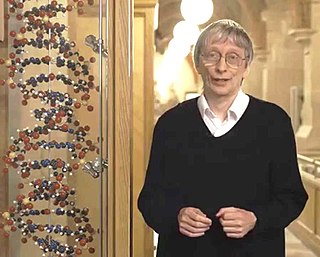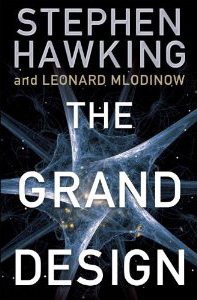The anthropic principle, also known as the "observation selection effect", is the hypothesis, first proposed in 1957 by Robert Dicke, that the range of possible observations that could be made about the universe is limited by the fact that observations could happen only in a universe capable of developing intelligent life. Proponents of the anthropic principle argue that it explains why the universe has the age and the fundamental physical constants necessary to accommodate conscious life, since if either had been different, no one would have been around to make observations. Anthropic reasoning is often used to deal with the idea that the universe seems to be finely tuned for the existence of life.
A cosmological argument, in natural theology, is an argument which claims that the existence of God can be inferred from facts concerning causation, explanation, change, motion, contingency, dependency, or finitude with respect to the universe or some totality of objects. A cosmological argument can also sometimes be referred to as an argument from universal causation, an argument from first cause, the causal argument, or the prime mover argument. Whichever term is employed, there are two basic variants of the argument, each with subtle yet important distinctions: in esse (essentiality), and in fieri (becoming).

David Elieser Deutsch is a British physicist at the University of Oxford. He is a visiting professor in the Department of Atomic and Laser Physics at the Centre for Quantum Computation (CQC) in the Clarendon Laboratory of the University of Oxford. He pioneered the field of quantum computation by formulating a description for a quantum Turing machine, as well as specifying an algorithm designed to run on a quantum computer. He is a proponent of the many-worlds interpretation of quantum mechanics.

The many-worlds interpretation (MWI) is a philosophical position about how the mathematics used in quantum mechanics relates to physical reality. It asserts that the universal wavefunction is objectively real, and that there is no wave function collapse. This implies that all possible outcomes of quantum measurements are physically realized in some "world" or universe. In contrast to some other interpretations, the evolution of reality as a whole in MWI is rigidly deterministic and local. Many-worlds is also called the relative state formulation or the Everett interpretation, after physicist Hugh Everett, who first proposed it in 1957. Bryce DeWitt popularized the formulation and named it many-worlds in the 1970s.
Memetics is a theory of the evolution of culture based on Darwinian principles with the meme as the unit of culture. The term "meme" was coined by biologist Richard Dawkins in his 1976 book The Selfish Gene, to illustrate the principle that he later called "Universal Darwinism". All evolutionary processes depend on information being copied, varied, and selected, a process also known as variation with selective retention. The information that is copied is called the replicator, and genes are the replicator for biological evolution. Dawkins proposed that the same process drives cultural evolution, and he called this second replicator the "meme". He gave as examples, tunes, catchphrases, fashions, and technologies. Like genes, memes are selfish replicators and have causal efficacy; in other words, their properties influence their chances of being copied and passed on. Some succeed because they are valuable or useful to their human hosts while others are more like viruses.

The multiverse is the hypothetical set of all universes. Together, these universes are presumed to comprise everything that exists: the entirety of space, time, matter, energy, information, and the physical laws and constants that describe them. The different universes within the multiverse are called "parallel universes", "flat universes", "other universes", "alternate universes", "multiple universes", "plane universes", "parent and child universes", "many universes", or "many worlds". One common assumption is that the multiverse is a "patchwork quilt of separate universes all bound by the same laws of physics."

Cosmogony is any model concerning the origin of the cosmos or the universe.
Quantum suicide is a thought experiment in quantum mechanics and the philosophy of physics. Purportedly, it can falsify any interpretation of quantum mechanics other than the Everett many-worlds interpretation by means of a variation of the Schrödinger's cat thought experiment, from the cat's point of view. Quantum immortality refers to the subjective experience of surviving quantum suicide. This concept is sometimes conjectured to be applicable to real-world causes of death as well.

Consilience: The Unity of Knowledge is a 1998 book by the biologist E. O. Wilson, in which the author discusses methods that have been used to unite the sciences and might in the future unite them with the humanities.
Indeterminism is the idea that events are not caused, or are not caused deterministically.

John David Barrow was an English cosmologist, theoretical physicist, and mathematician. He served as Gresham Professor of Geometry at Gresham College from 2008 to 2011. Barrow was also a writer of popular science and an amateur playwright.

The Kalam cosmological argument is a modern formulation of the cosmological argument for the existence of God. It is named after the Kalam, from which its key ideas originated. William Lane Craig was principally responsible for giving new life to the argument in the 20th century, due to his book The Kalām Cosmological Argument (1979), among other writings.

The Fabric of Reality is a 1997 book by physicist David Deutsch. His follow-up book, The Beginning of Infinity, was published in 2011.
Nicholas Maxwell is a British philosopher.

Parallel Worlds: A Journey Through Creation, Higher Dimensions, and the Future of the Cosmos is a popular science book by Michio Kaku first published in 2004.

Everything, every-thing, or every thing, is all that exists; it is an antithesis of nothing, or its complement. It is the totality of things relevant to some subject matter. Without expressed or implied limits, it may refer to anything. The universe is everything that exists theoretically, though a multiverse may exist according to theoretical cosmology predictions. It may refer to an anthropocentric worldview, or the sum of human experience, history, and the human condition in general. Every object and entity is a part of everything, including all physical bodies and in some cases all abstract objects.
Explanatory power is the ability of a hypothesis or theory to explain the subject matter effectively to which it pertains. Its opposite is explanatory impotence.
An index list of articles about the philosophy of science.

The Grand Design is a popular-science book written by physicists Stephen Hawking and Leonard Mlodinow and published by Bantam Books in 2010. The book examines the history of scientific knowledge about the universe and explains eleven-dimensional M-theory. The authors of the book point out that a Unified Field Theory may not exist.

Joel David Hamkins is an American mathematician and philosopher who is O'Hara Professor of Philosophy and Mathematics at the University of Notre Dame. He has made contributions in mathematical and philosophical logic, set theory and philosophy of set theory, in computability theory, and in group theory.












